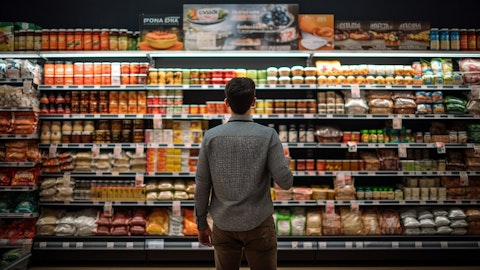Fernando Fernandez: Yes. I would add only you know that, of course, we will invest for aligning production and distribution capacity with our demand. But we will put constraints to ensure that we focus ourselves in increasing asset utilization and operational effectiveness where we see opportunities.
Unidentified Company Representative: Our next question comes from Bruno at Bernstein.
Bruno Monteyne: Now Hein, when I’m listening to the presentation and your numbers, there seems to be a material disconnect between the language of the results update and what consumers are saying or doing, right? I mean, just quoting from your words, it’s about unmissable superiority, science-backed innovations, holistically superior products and unmissable marketing campaigns. But obviously, that’s a big clash with your competitiveness. It’s not of worse than before, down to 37%. Even on your new measures of sales-weighted market share, it’s still awful or worse. And I sort of see like a big language disconnect. On the one hand, this amazing business, on the other one, consumers not buying it. So one of those things sort of can’t be totally right.
And I do know and I listen that you say you’re disappointed in that. But you’re not really providing an analysis of why is this for underperforming your competitors. You’re just saying you’re disappointed, but keep saying the business is amazing. And then when I look at what Peter is doing in Ice Cream, he’s clearly taking the pricing and trying to change the direction of volumes. That obviously suggests that profitability was still too high and pricing needs to be adjust. And it makes me wonder, given that disconnect that’s so obvious in the results, is your margin is simply just too high? And you keep talking about gross margin targets. Gross margin target, is that going to stop you from doing the right thing on pricing if you’re suddenly so focused on gross margin?
So that’s the first question. And the second one is sustainability, you talked about it at priorities and it’s been an ongoing theme, but also see a lot of kind of new European Union laws coming in moving the bar higher and higher. There’s more news about far more supposedly sustainable, but not being that sustainable. Should we start expecting material inflation in terms of really paying for truly sustainable commodities in the next coming years? Should that be part of our margin modeling going forward?
Hein Schumacher: Thanks, Bruno, for your provoking questions. Look, I mean, let me be quite clear: I don’t think there’s a disconnect at all. We are obviously with the business winning percentage that we talked about in Q3, which is about the same level now. And even though that is not a perfect metric, I mean, we’ve talked about that, but we wanted to be very consistent in laying it out. That competitiveness number is bottoming out. We are not happy with that. I’ve been — we have been very, very clear on that. However, we are not sitting on our laurels. We have given — we’ve presented a clear action plan by the end of October and exactly around the themes that you talked about, which is about unmissable brand superiority, making sure we develop the market and the categories, making sure that we drive up our margin and so forth.
That is what we’re doing. That is what we’re executing against. And that is not something that you turn in 1 quarter, but we have also signaled that we’re going to — that you should see improvement on this in the balance of 2024. So I think we’ve given a very clear guidance towards that. And hey, it’s never one size fits all. So whilst we’re not super excited about the competitiveness number, if you look at our overall reported growth numbers of the company, which are helped by roughly 30% of our business that is doing actually very well, that’s the higher growth part of the business, we should also highlight that. This is not a story that we’re all disappointed. No, there are some real pockets of strength in the company that serve as wonderful and strong examples and that will help us going forward.
But we are focused on improving those things that don’t, that we feel that can be improved and that is truly what all our actions are about. And again, when we do that well, we do see some early signs of success and we will continue to report to you about that in the next quarters. I mean, your question on Ice Cream. What was important that we talked about at the end of Q3, Peter approaches the Ice Cream group very much as a system, and that’s super needed. You have to connect to your supply chain, your buying, your distribution, obviously investments in cabinets and freezers and then the whole price/mix and top line strategy. You need to tie that — even more than in any other business group, you need to tie that very strongly together. That’s what we’re doing.
And that means you want to get leverage from volume. So there was a clear and a conscious decision to drive extra promotional activity in North America, but that was a surgical way of going about it. And already volumes are — on a comparable basis were picked up in the fourth quarter were better. North America actually posted positive volumes for Ice Cream and our out-of-home Ice Cream business in the fourth quarter posted positive volume growth numbers. Now we need to see that improving going forward in 2024. And we are — we believe that there will be a better 2024 for Ice Cream than what 2023 looked like, both on the top line as well as on margin. On sustainability, you’re absolutely right. The bar gets higher, but hey, I’ve got, on that sense, good news.
I mean, all the efforts that the company has made over the last few years, that really helps us now. And when we laid out our sustainability framework and we’ll talk more about that in our new Climate Transition Action Plan in the AGM in May, it’s all about transparency. It’s all about realizing impact in the short term. And it’s all about making sure that we — again, we report behind a more transparent framework on a regular basis about our progress and we are very well prepared for that. On deforestation-free and palm oil, I think we’re leading in the world and this is something that we continue to do, so I wouldn’t expect a major downside from that.
Unidentified Company Representative: Our next question comes from Olivier at Goldman Sachs.
Jean-Olivier Nicolai: Two questions, please. Going back to Slide 16 on gross margin. Should we expect gross margin in 2024 to actually recover even above the 2019 level considering that you have a much better product mix and you have implemented some portfolio changes as well over the last 4, 5 years? And then perhaps could you break up the 200 bps gross margin improvement between price, mix and portfolio changes? And then just a follow-up on Ice Cream, if I may. You flagged down-trading in Europe. Could you give us a bit more detail as well if you see the same down-trading in the U.S.? And do you expect any impact in the midterm from GLP-1 drugs?
Hein Schumacher: Thanks, Olivier, for your — for the question. I mean, on gross margin, I’ll make some general comments first and we’ll hand over to Fernando, and then I’ll come back on Ice Cream. Look, you’re right. I mean, our gross margin is improving behind not just mix and premiumization, but also from increased productivity. This was a major priority for us in the Growth Action Plan and we’re moving forward with that with an enormous dedication in 2024. When we talked earlier about the Growth Action Plan that we would like to see gross margin return to prepandemic levels in the plan period and that was sort of in the range of 2025, 2026, with the plans currently on the table we are seeing indeed an acceleration of gross margin growth and we aim to get back to prepandemic levels earlier. Clearly, some things need to play out in the year, but I’m positive about the progress that we’re making there. Fernando, anything you want to add?
Fernando Fernandez: No. Just the only point is we see our price coverage going up, our mix improving and the impact of portfolio change all contributing to the gross margin improvement. So there are different levels all working in the right direction. And as I have said, this is the backbone of our financial plan going forward and we will put a lot of focus on that, particularly in investing to increase our net productivity.
Hein Schumacher: Wanted to make some comments on Ice Cream, and I’m afraid some of them may sound repetitive because we made them before. Is there down-trading in the U.S. like we’ve seen in Europe, for example, the migration to private label and this is something that I talked about at the end of Q3? No, I wouldn’t say so. I wouldn’t — I mean, I think it’s a different dynamic in the U.S. We stepped up promotional intensity to address competitiveness. And I feel, with the numbers we’re getting in that, that’s working and volumes, as I said, turned to positive in North America in Q4. Clearly, we will price competitively in Ice Cream. We’re very determined on that. But some key ingredients in ice cream remain inflationary. So think of sugars, think of cocoa.





